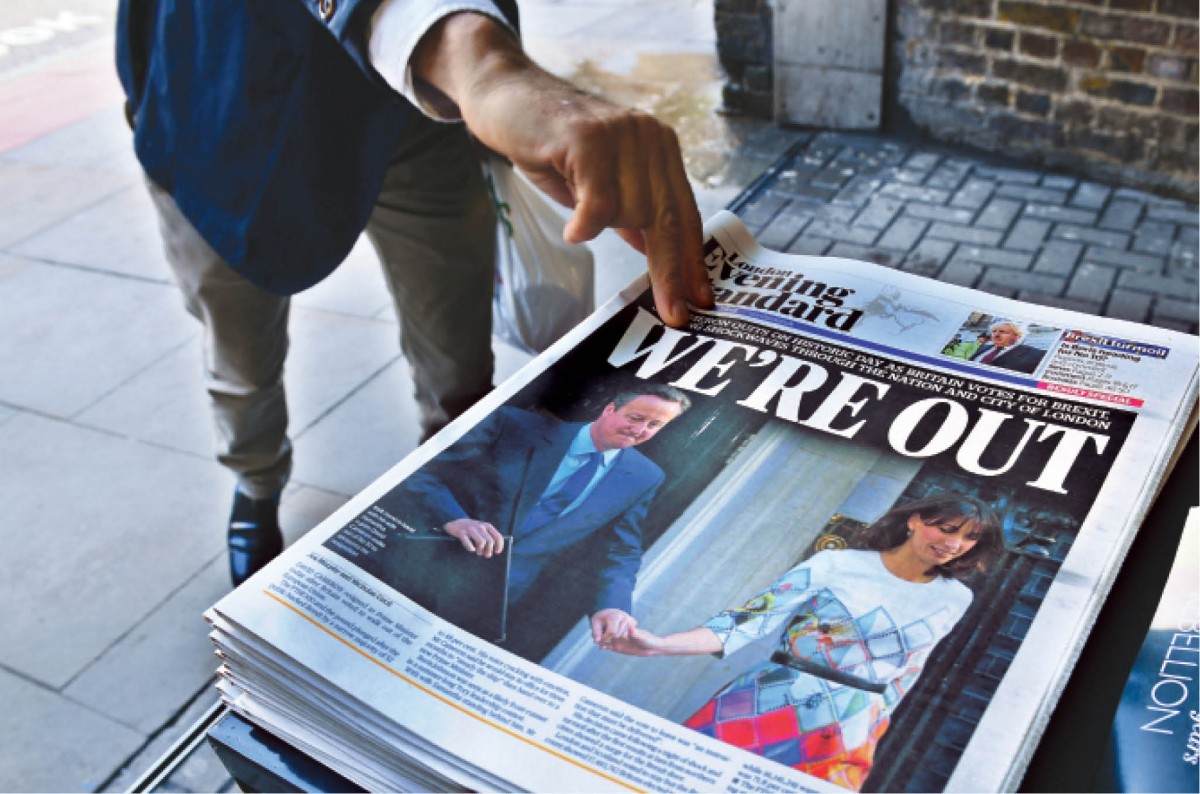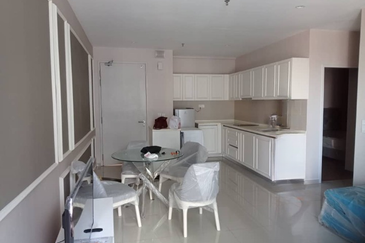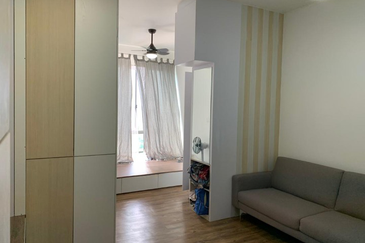
AT 10pm on June 23, the polls for the referendum on whether the UK should remain in or leave the European Union (EU) closed. Some nine hours later, the official results were out and the leave camp was declared the winner by a narrow margin.
It was a historic and shocking moment. The impact was felt immediately — the following day, the pound sterling fell to a 31-year low and Moody’s cut the nation’s credit rating outlook to negative. The currency then fell more than 3% on June 27 to a new low.
The UK also lost its top AAA credit rating from Standard & Poor’s, and Fitch lowered the country’s rating from AA+ to AA. The BBC reported that S&P said the Brexit result could lead to a “deterioration of the UK’s economic performance, including its large financial services sector”, and Fitch forecast an abrupt slowdown in growth in the short term.
Prime Minister David Cameron has resigned and plans to step down in October, leaving the next prime minister to negotiate and facilitate the exit. Meanwhile, the nation is divided between the leave and remain camp.
What does this mean for Malaysian investors and developers with projects in London? Local and UK consultants and developers share their thoughts on the outlook for the property market and the expected impact of Brexit.
Nicholas Holt (Head of research for Asia-Pacific, Knight Frank)
 The UK has long been a destination for Asian real estate investors, with the attraction of strong liquidity, stable governance, transparency and clear title, meaning that investors from China, Hong Kong, Singapore, Malaysia and Thailand have all invested in bricks and mortar in the country.
The UK has long been a destination for Asian real estate investors, with the attraction of strong liquidity, stable governance, transparency and clear title, meaning that investors from China, Hong Kong, Singapore, Malaysia and Thailand have all invested in bricks and mortar in the country.
With the decision to exit the EU, for existing Asian property owners, the fall in the pound sterling will impact the repatriation of any income return, as well as the gains on any disposal. Although there is likely to be more volatility in the market, ultimately most investors are looking at the long term — so, they will continue to hold their assets in the hope that any short-term instability will eventually subside when there is more clarity on the UK’s role in Europe.
The decision, however, could also present a buying opportunity as the significant drop in the value of the pound sterling, as in 2009, could lead to an uptick of interest by Asian investors, who, over the last few months, have adopted a wait-and-see approach to the referendum — and will now see their buying power increase significantly.
Chinese, Singaporean and Hong Kong investors especially, who look at both commercial and residential properties — most likely in London — will be monitoring the market carefully and looking for opportunities to potentially increase their exposure over the coming weeks and months.
Adam Challis (Head of residential research, JLL UK)
 Brexit will bring short-term opportunity for international investors but weaker occupier demand and subdued capital flows. Investors may seek opportunities in the short term after the pound sterling plummeted to a 31-year low as markets opened on June 24. International purchasers, in particular, can benefit from the currency arbitrage that has been opened up by a weaker pound sterling.
Brexit will bring short-term opportunity for international investors but weaker occupier demand and subdued capital flows. Investors may seek opportunities in the short term after the pound sterling plummeted to a 31-year low as markets opened on June 24. International purchasers, in particular, can benefit from the currency arbitrage that has been opened up by a weaker pound sterling.
However, the London housing market will feel the effects of the leave decision more deeply due to the interconnected trading relationship between London and the rest of Europe. This will exacerbate the uncertainty for London’s homeowners.
While the focus leading up to the referendum had been on the UK’s international trading relationships, JLL is deeply concerned that domestic politics will now be the key risk to the housing market.
Regardless of the referendum’s outcome, the UK has a deep housing supply imbalance and concerted attention from politicians to deliver credible, lasting solutions to the supply conundrum is desperately needed. Protracted infighting within the UK’s political parties will only harm the UK economy and any chance of a timely recovery from the expected economic slowdown.
Datuk Seri Terry Tham (Managing director, Eastern & Oriental Bhd)
 We maintain a flexible and agile stance in the face of changes in the market environment. Our UK projects are underway and are expected to progress as planned while the group continues to build its presence in the international market.
We maintain a flexible and agile stance in the face of changes in the market environment. Our UK projects are underway and are expected to progress as planned while the group continues to build its presence in the international market.
Specifically, we have carefully selected our three small to medium-scale projects based on the fundamental strengths of the respective sites and their locality. Princes House in Kingsway is our pilot boutique project in London, comprising private residential apartments, serviced apartments as well as retail and food and beverage outlets.
A substantial number of the private apartments has been sold while the serviced apartments were sold through a bidding exercise that was just concluded. It attracted strong interest and is currently awaiting the exchange of contract, which is expected to take place in the next four weeks.
The retail component was sold 12 months ago. The entire project will be completed by end-July. We do not foresee any adverse impact on the project given that it is almost completed.
Meanwhile, ESCA House is a small-scale conversion project, turning offices into only 26 units of private apartments located in the middle of Queensway and Bayswater. The area traditionally attracts visitors and investors mainly from the Middle East and Far East countries, especially China, Hong Kong, Singapore and Malaysia, given its strong mixed Asian cultural commercial area.
Thames Tower and Landmark House at Hammersmith, which we acquired last year, are still going through the planning process and, hence, remain flexible. The site has existing office buildings ripe for redevelopment. However, while the decision on the optimal use of the site is being finalised, the building is currently fully let to mainly small and medium enterprises, which are in the international technology and media businesses.
Also, because of its connectivity and accessibility to London’s West End and Heathrow Airport, the prospect of a mixed-use development with offices targeted at small and medium enterprises as well as a hotel and serviced apartments for the leisure tourism sector would still be viable.
Tan Sri Liew Kee Sin (Executive vice-chairman, Eco World International Bhd)
 The outcome of the UK’s EU referendum, with a decisive win by the Brexit camp, was largely unexpected. While there will be uncertainties ahead, Eco World International Bhd (EWI) is optimistic that the results hold a silver lining for the group and its customers going forward.
The outcome of the UK’s EU referendum, with a decisive win by the Brexit camp, was largely unexpected. While there will be uncertainties ahead, Eco World International Bhd (EWI) is optimistic that the results hold a silver lining for the group and its customers going forward.
Now that the results of the EU referendum are known, the long uncertainty, which caused many investors to hold back on decision-making, is finally over. Britain is still a hugely important economy in Europe with highly principled, professional and competent leaders. We have every confidence that the UK government will do its utmost to take proactive measures to assuage post-Brexit concerns and move the UK forward on every front.
A weaker pound sterling will, in fact, help our Malaysia, Singapore, China and Hong Kong-based customers by bringing down their cost of investment. Further, customers from these countries buy London properties for reasons that have nothing to do with whether the UK is a part of the EU.
Also, London’s position as a prime destination for global real estate investment is unlikely to change given that many of the fundamental drivers of demand (transparency of laws, security and ease of ownership, shortage of supply and London’s attraction as a global education, cultural and tourism hub, among many other factors) are still intact.
Boris Johnson, a prominent Brexit leader, is pro-development as proved by his track record as mayor of London. He is backed by many senior and experienced leaders, and now that the British people have spoken, the entire UK government will be focused on ensuring that the country sends out a clear message that it remains ready and open for business. This will benefit companies seeking to invest and grow their business in the UK.
For EWI specifically, it should be noted that through our proposed initial public offering, we will be raising equity in ringgit. Now that the pound sterling has fallen, it means that the cost we have to inject into the UK to pay for the development of our three projects there will be lower. If this situation holds, it will also make it cheaper for EWI to acquire new sites, post-listing.
Previndran Singhe (CEO, Zerin Properties Sdn Bhd)
 Confidence in the UK property market, especially in London, is still strong, despite the Brexit decision. There will, of course, be a wait-and-see attitude among investors with regards to which way the pound sterling will move, but once that is settled, I do see movement back into the London market.
Confidence in the UK property market, especially in London, is still strong, despite the Brexit decision. There will, of course, be a wait-and-see attitude among investors with regards to which way the pound sterling will move, but once that is settled, I do see movement back into the London market.
For non-EU nationals like Malaysians who are either looking for an option to relocate, a holiday home or an investment, or all three, I do not see why Brexit makes a difference. London still has political and economic stability and a sound legal system, and provides a vibrant lifestyle.
The scaremongers are always there but one should look at the situation realistically. Will there be owners who sell and leave now? Yes, I do see some, especially where EU institutions relocate and transfer staff. The other issue is immigration — there are millions of EU nationals living and working in the UK. But will the country disallow the entry of EU nationals now? I do not see this happening, especially if they play an active part in the UK’s economy. Meanwhile, those who are well-heeled will maintain the status quo, living and working in the UK. After all, London property does attract mainly the well-heeled.
Prime London property has always been favoured by savvy international investors. According to a study by Knight Frank in 2013, 49% of buyers of prime central London properties were non-British citizens, while 28% did not even live in the UK and only 16.5% were from other EU countries. So, the immediate effect of Brexit on London property, in my opinion, will be limited.
Meanwhile, I think the pound sterling will strengthen when there is more clarity on Brexit and after the appointment of a new prime minister. Prime London property has always been — and will always be — favoured by savvy international investors.
Lucian Cook (Head of residential research, Savills UK)
 It is impossible to predict what will happen to the UK housing market with certainty until the full implications for the wider economy are known. What we do know from lead indicators, such as the Royal Institution of Chartered Surveyors’ survey, is that uncertainty pre-referendum had an impact on new buyer enquiries. A continuation of that uncertainty is likely to pull back price growth and transactions in the short term.
It is impossible to predict what will happen to the UK housing market with certainty until the full implications for the wider economy are known. What we do know from lead indicators, such as the Royal Institution of Chartered Surveyors’ survey, is that uncertainty pre-referendum had an impact on new buyer enquiries. A continuation of that uncertainty is likely to pull back price growth and transactions in the short term.
Over the medium term, the prospect of an increase in mortgage interest rates and a reduction in wage growth are expected to exert greater pressure on affordability, particularly in London, where borrowers are stretched even further. However, the precise impact depends on how severely these affordability drivers are affected.
An increase in effective interest rates will also have heightened relevance for mortgaged buy-to-let investors, given the progressive reduction in tax relief they will get on their mortgage payments in the future. The inherent undersupply of housing in the UK should continue to underpin the market.
The prime markets, which are typically more volatile, may well see a greater short-term impact. However, along the line, a fall in the value of the pound sterling should bring some international buyers back into the market, albeit with potentially less gusto than in previous downturns given the higher stamp duty costs.
Monty Nawaz (CEO, Saffron International Sdn Bhd)
 Brexit has led to uncertainty among mainstream investors. However, there are many savvy and institutional investors who are aggressive due to the fall in the pound sterling. The key strategy should be to acquire viable properties that are not overpriced and off-plan, which has a high risk.
Brexit has led to uncertainty among mainstream investors. However, there are many savvy and institutional investors who are aggressive due to the fall in the pound sterling. The key strategy should be to acquire viable properties that are not overpriced and off-plan, which has a high risk.
In the short term, investors should ideally look at opportunities with value-added potential, with a two to three-year maturity as the pound sterling stabilises. Housing in the heartland of London remains strong due to an acute shortage of supply and high demand from local first-time buyers looking for affordable homes. We expect to see a surge of launches in Asia, where developers will try to capitalise on uninformed investors who may be lured by overpriced and off-plan projects, which the developers are unable to sell to the local buyers in London. While discounts and freebies that come with guaranteed yields will be offered at some of these exhibitions, we advise investors to be wary of deals that seem too good to be true.
In the long term, we continue to foresee an acute shortage of affordable housing in London.
This article first appeared in City & Country, a pullout of The Edge Malaysia Weekly, on July 4, 2016. Subscribe here for your personal copy.
TOP PICKS BY EDGEPROP

The Villa @ Serai Saujana / Villa Serai Saujana
Shah Alam, Selangor

Trio by Setia
Bandar Botanic/Bandar Bukit Tinggi, Selangor

Alam Sanjung Serviced Apartment
Shah Alam, Selangor






















